In this article:
If you are suffering from asthma, you are familiar with the discomfort an asthma attack brings. Wheezing, breathlessness, tightness of the chest, and coughing are some of the symptoms of an asthma attack.

Allergens including dust, pollen, mold, dampness in the environment, and tobacco smoke can trigger an attack.
Asthma is usually treated with medications prescribed based on age and frequency and severity of the attacks. The medication can either be long term, which reduces the inflammation in the airways, or short term, which immediately relaxes swollen airways and provides quick relief.
Along with medication, some alternative methods for managing asthma are often recommended, which include using herbal remedies or supplements and practicing certain breathing exercises.
Several herbs are being studied for the role they may play in alleviating some of the symptoms of asthma to provide relief.
Herbs for Asthma
Herbal remedies may or may not be combined with traditional medications. When used alongside medication, it becomes a part of a complementary treatment plan, while using herbal remedies alone is referred to as alternative therapy.
It is critical to note that neither of these remedies should be started without first consulting your treating physician.
Here are the most common herbs with claims to reduce asthma symptoms.
1. Turmeric
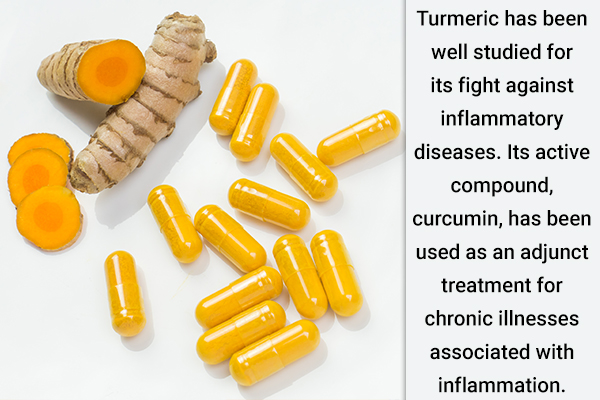
This golden-yellow root that is used in South Asian cooking by drying and then powdering has been long used as medicine in Ayurveda, the ancient Indian system of medicine. Many people all over the world are now turning to it for its host of benefits.
Turmeric has been well studied for its fight against inflammatory diseases. (1) Its active compound, curcumin, has been used as an adjunct treatment for chronic illnesses associated with inflammation. (2)
As an asthma attack primarily occurs due to the inflammation of the airways, curcumin may be beneficial. In one study, patients with mild to moderate bronchial asthma reported an improvement in airway obstruction with the use of curcumin capsules. (3)
Please note that curcumin’s bioavailability is a topic of heavy debate, and the effective dosage of curcumin that may help with asthma still needs to be studied.
How to use:
A curcumin capsule at 500 mg in addition to standard medication for asthma may be beneficial. (3)
2. Ginger
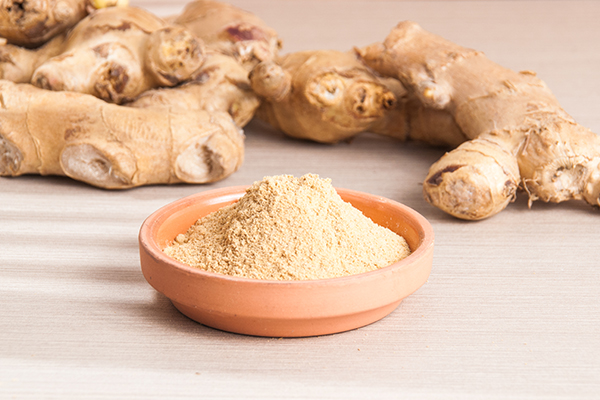
Studies have looked into the role of ginger in asthma. A mice model study investigating the use of ginger extracts for allergy-induced asthma found a reduction in immune response markers in the subjects. Inflammatory markers were also significantly reduced. (4)
More extensive research is needed to establish the efficacy of ginger for asthma relief.
How to use:
Ginger tea is a safe way to gain its benefits. Steeping a few slices of ginger root in hot water for a few minutes is effective.
3. Black seed
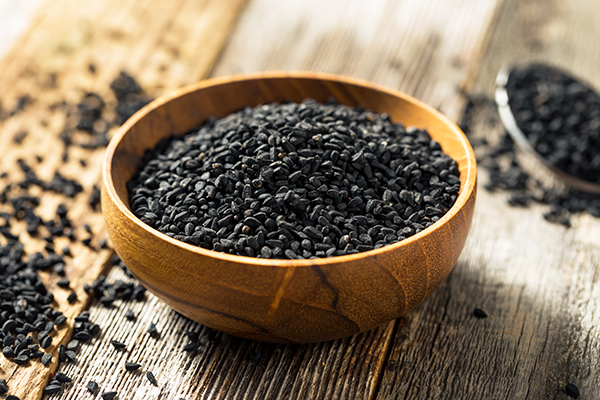
Black seed or black cumin finds its use in many forms of alternative medicine including Unani and Ayurvedic.
In one review summarizing the role of black seed in controlling asthma symptoms, the active compound of black seed, thymoquinone, was investigated in animal and cellular models. It was found that it showed anti-inflammatory effects. Clinical studies featured in the same review observed an improvement in clinical symptoms in asthmatic adults. (5)
There is also an emphasis on the need for more research on the efficacy of black seed.
How to use:
In a 4-week study, 80 adults taking 500 mg of black seed oil capsule two times per day showed better asthma control. (6) While more research is needed on the recommended amount of black seed to take, it is a good dose to start with.
4. Garlic and ginseng
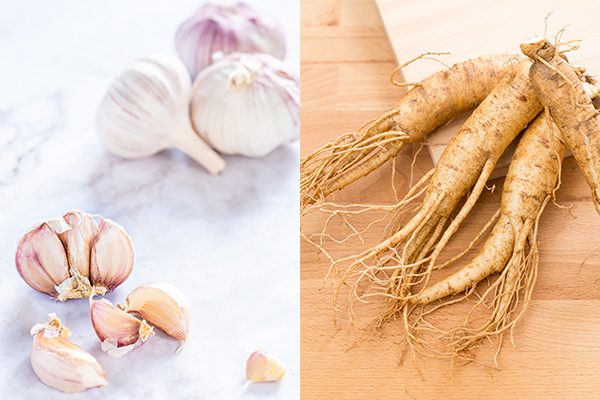
Ginseng is a Chinese herb used as medicine to treat colds, build immunity, and improve general health. (7)
Garlic is advocated for its use against cardiovascular and lipid disorders. (8)
In a study done on rats, two groups were injected with ginseng and garlic at doses of 200 mg/kg body weight and 100 mg/kg body weight, respectively. It was found that both groups showed a decrease in inflammation of the lungs caused by the irritant that caused bronchial obstruction and difficulty in breathing. (9)
Even though the study shows some promise, more thorough human trials need to be conducted to establish the usefulness of garlic and ginseng for asthma.
5. ASHMI (Chinese herbal blend)
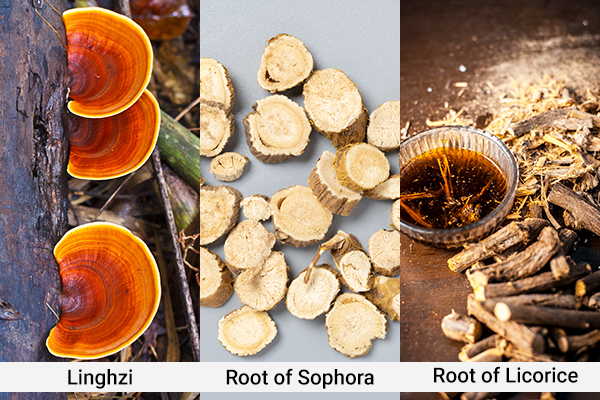
In the past few years, a specific blend of Chinese herbs known as ASHMI has been studied for its use in asthma. It is made up of three primary herbs: linghzi (a mushroom), kushen (root of sophora), and gancao (root of licorice).
In one study, mice both aged and young were treated with ASHMI. A significant decrease in lung inflammation was observed. The treatment also lowered the compound that triggers an allergic response. This is crucial in the treatment of asthma symptoms and prevention of an asthma attack. (10)
In another study, nonsmoking allergic humans who consumed ASHMI at varying doses between 600 mg and 1,800 mg for a week showed a safe tolerance toward it. (11)
Although studies seem to indicate the usefulness of the ASHMI, research is lacking due to studies being done either on animals or with a small group of participants not sufficient to establish conclusive results.
Risks Involved

Herbal remedies need to be considered very carefully before using them with the intention of managing asthma. Most herbs and natural remedies are still being studied, and whatever evidence is being presented is not sufficient to make a conclusive statement about their benefits.
Moreover, herbs and herbal medicines are not FDA approved and, as such, run a very large risk for complications. It is therefore highly advised to consult a doctor before including any alternative remedy for the management of asthma and its associated symptoms.
Most-Asked Questions
Can I take herbs instead of medicines?
Any amount of research done on herbs for the management of medical conditions has been done in conjunction with medical intervention. It is not recommended to stop taking traditional medicine in favor of herbs or herbal medicines.
Can I use all the herbs together?
It is not advisable to combine more than one herb unless the recommendations suggest, like in the case of ASHMI.
Cases of contraindications may occur, and since not enough research has been done, there is a chance you may worsen your asthma or develop something new entirely.
Herbs need to be taken in their recommended dosages for them to be effective and to check tolerance in individual patients.
Final Word
Suffering from a chronic condition such as asthma and its symptoms can be extremely debilitating. It is not uncommon in such a case to turn to natural remedies or alternative medicine to seek comfort and relief.
However, with its limited research, any herbal or alternative medicine cannot be suggested as an effective alternative to asthma medication. Consulting a doctor is extremely important before beginning or including any new remedy into the care or treatment plan.
- Was this article helpful?
- YES, THANKS!NOT REALLY


